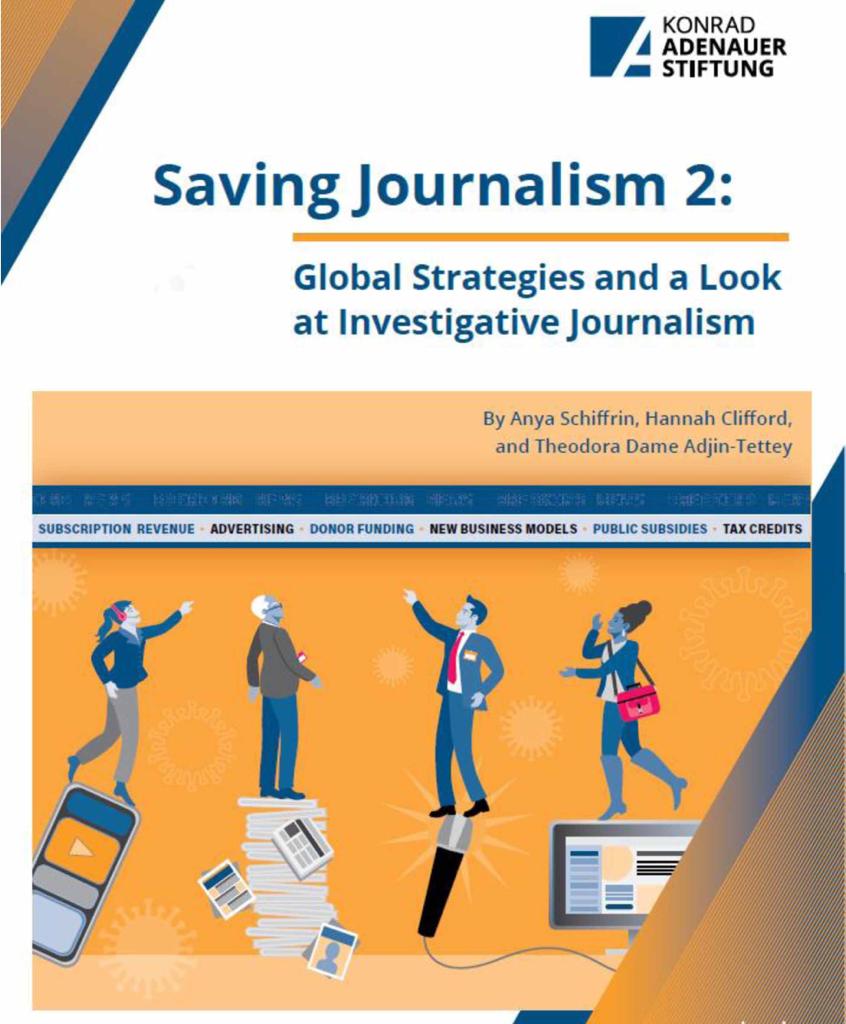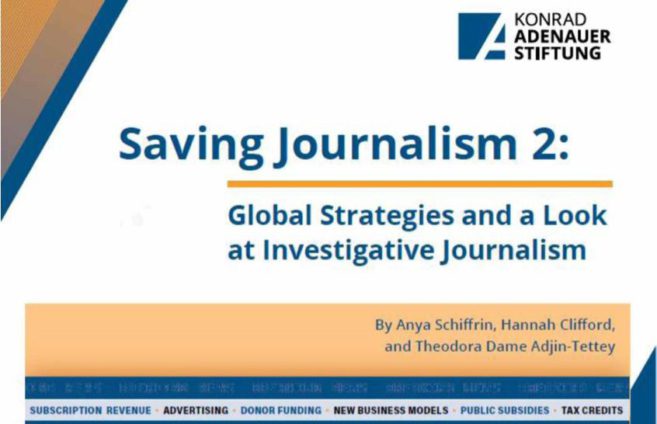In the past few years, many well-meaning actors in the media space have been concerned about the financial sustainability of journalism, especially quality journalism. And this is not without cause. The media industry the world over has had to grapple with falling advertising revenues due to a myriad of factors including stern competition from digital giants, dwindling public trust in the media, media capture and disinformation. The ripple effects of the global health crisis we continue to battle out have, no doubt, also exacerbated matters.
But quality journalism is one of the prerequisites for societal sustainability and the protection of democracy, which in turn promotes human rights and dignity. Consequently, media organisations have taken various pragmatic initiatives to remain financially sustainable or at least to stay afloat in order to carry out their mandate.
Rather unfortunately and unwillingly, those who have not been able to withstand the heat have had to fold up, or better still scale down their coverage and production. The result of this is loss of source of livelihood and precarious work conditions for media workers.
Other media stakeholders are not just looking on unreservedly. Media researchers particularly have been working around the clock, engaging in scholarship to provide interventions on how media organisations can be innovative as well as proposing systemic measures to ensure media viability.
We have also been contributing our bit on this current discourse and solution-building agenda. Our efforts have yielded a number of publications, including the latest released
Saving Journalism 2: Global Strategies and a look at Investigative Journalism

Taking into account the fact that saving journalism requires us to “flip the script and look from the ground up” says Public Square’s Angelica Das as there is no single solution to save or transform journalism, we share with you some of our findings as well as proposals that we reckon will contribute to making journalism more sustainable in the long term.
What We found
While many agree that government support is critical to saving quality journalism, others have expressed concerns about governmental influences on reportage, while others believe governmental support for media should not be a priority in a region like Africa because of other pressing challenges in the region which require governmental interventions.
What then is the role of philanthropy in saving journalism? Interestingly, although many media organisations are sceptical about government support of any form, they willingly accept funding from tech giants and development aid organisations. Some are of the view that philanthropy is not the best form of solution for saving journalism as it does not enable sustainable growth. One of our interviewees, Daily Maverick editor, Branko Brkic, aptly puts it this way: “Philanthropy is catching drops from a leaky bucket as it cannot be a long-term approach in saving journalism”.
Others have also argued that philanthropy influences reportage in certain instances, while others believe it has become a public relations strategy for many organisations supporting journalism, including tech giants.
These are genuine concerns considering how some tech giants have seemingly employed funding as a public relations strategy to buy goodwill—especially in markets where they are making attempts to avert regulation.
There are also concerns about funding organisations restricting journalistic autonomy and creating a reliance on grants. But we believe funding from development aid, philanthropy, and venture capital is a necessary addition to the taxonomy of interventions needed to save journalism. In fact, refusing funding is no longer an option for many media outlets.
Despite the criticisms it comes with, the past year saw an increase in philanthropy in the media space. We believe that a careful coordination among funders is critical in ensuring that the tendency of media funders supporting established media organisations, while digital startups with a lot of potential, receive less funding is done away with.
We likewise believe that the following criteria in determining which outlets to finance can prove useful for media development funders: Are you earning trust? Are you inclusive? Are you culturally relevant? Are you meeting basic information needs?
The implementation of Australia’s News Media Bargaining Code in 2021 has further opened discussions around how Big Tech can contribute to saving journalism through regulations and taxation. However, there is no public information available as to how much media organisations in Australia received from Google and Facebook.
There is also talk about smaller media outlets benefitting less from it. Nonetheless, the shovelling of resources from companies with an enormous amount of money to the media sector, resulting from the News Media Bargaining Code, is an important step forward which the media elsewhere can opt for, notes economist Richard Denniss, an economist with The Australia Institute.
Taking a cue from how this could be useful in saving the media, several countries (including Canada, Italy, and South Africa) have expressed interest in emulating the Australian Code but have not acted so far. It is hoped that some bold steps are taken by countries in Africa to benefit from the bargaining code.
This demands consensus building among countries in Africa and the outsourcing of an independent arbitrator to negotiate a good deal for the various categories of media. The technical, moral, and economic support from competition regulators across countries also have a radical bearing on how negotiations turn out.
The next best option to make Big Tech contribute to saving journalism is through tax on tech to be earmarked for journalism, which some of our interviewees thought was a far better alternative than Australia’s Code.
One interviewee called for a “social interest levy” on the gross revenue turnover of the platforms to be allocated to support public-interest journalism, rather than taxation so that Big Tech is not seen directly funding journalism. He proposes a voluntarily-agreed-upon levy and an independent body becoming the allocator of those funds to address areas of market failure, including public interest journalism.
Some players within the media are calling for governmental support in the form of direct subsidies and tax credits, but this is without concerns. In July 2020, Indonesia announced a journalism stimulus package, including tax credits, direct subsidies, abolition of the value-added tax for newsprint, suspension of electricity charges for the media industry, a 50 percent reduction in corporate tax, and a subsidy for news outlets in the form of direct payments, on the condition that outlets educated the public on how to handle Covid-19. While some thought these policies contributed to saving journalism, others saw it as an example of direct government influence in what content was produced.
Some actors in countries in the global south like Ghana have equally expressed apprehension about the potential influence of government on media reportage through government-directed subsidies, advertising or even professional training and development.
Besides, there is a feeling that many of the policies outlined above would not be suitable for many media houses as many outlets have small staffs, making a policy like tax credit for hiring new reporters rather unsustainable.
Looking into the future
Economists interviewed believe that there is no perfect fix for saving journalism, but they hold the pragmatic view that if interventions are not harmful, then they are good enough. They are clamouring for public support and varied interventions including tax on tech, which would be channelled to support quality journalism, as well as adoption of the Australian News Media Bargaining Code.
We are also of the view that the success of responsible and good journalism will depend not just on financial support but on the media ecology in which it is located. That is why it’s important to maintain the most important aspect of the enabling environment – respect for fundamental rights and media freedom.
Media freedom is the bedrock for the sustainability of journalism. Without media freedom, no amount of funding or focus on the future will ensure genuinely independent journalism.
Likewise, without respect for human rights, government support to media would be a means to media capture. Even so, with freedom comes responsibility and accountability. As we look for new ways to make quality journalism sustainable, may this freedom be found and entrenched.
*****
Our full report, Saving Journalism 2: Global Strategies and a Look at Investigative Journalism, is available for free download here.
The lead author on the report is Anya Schiffrin, Director of the Technology, Media, and Communications program and senior lecturer, Columbia University’s School of International and Public Affairs. Co-authors of the report are Hannah Clifford, Theodora Dame Adjin-Tettey, Ryan Lee and Matthew Reysio Cruz. [ed: three are at Columbia (SIPA and journalism school) and Theodora is a research associate at Rhodes University, South Africa and a lecturer at the University of Ghana.]
Latest Stories
-
Power Victory Chapel rebrands as Impact City Church after 20 years of ministry
16 minutes -
I can’t be like my father, but I can be honest about him – Sekou Nkrumah
33 minutes -
Security man murdered in Wa
45 minutes -
Part II: The big find in Savannah region: was Akamade a hub for Islamic studies?
1 hour -
GTEC sanctions UCC after Vice Chancellor defies retirement directive
1 hour -
Prince Kudufia & Mary Sunday crowned champions of 2025 Osagyefo Criterium
1 hour -
Ghana joins UN fight to protect humanitarian workers in conflict zones
2 hours -
Cardi B breaks Guinness World Record with 176 drone album deliveries
2 hours -
Revamped Wa Power SC eye promotion push in 2025/26 Division One League
2 hours -
Galamsey: ‘Akufo-Addo, other bigwigs should be in prison’ — Protester
2 hours -
Mishasha unleashes feel-good anthem ‘Shayo’
3 hours -
MobileMoney Ltd CEO pushes for equal digital finance from remote villages to urban hubs
3 hours -
MobileMoney Ltd’s Shaibu Haruna champions digital finance for every African at MTN Fintech Summit
3 hours -
GoldStars dismiss Frimpong Manso after JS Kabylie CAF Champions League loss
3 hours -
L’AINE HR signs on as official participant of UN Global Compact Ghana
3 hours

